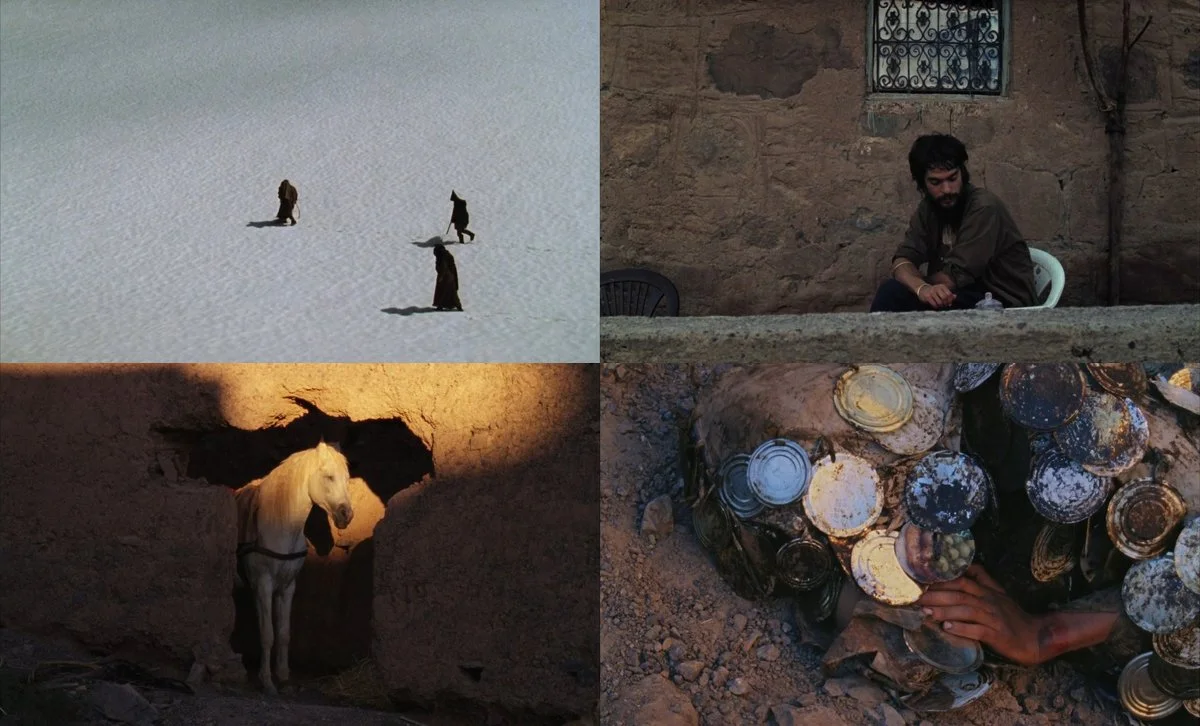
“A Distant Episode” and “The Sky Trembles and the Earth Is Afraid and the Two Eyes Are Not Brothers” both concentrate on the futility of racial interaction and Western pride in its relationship with the “other”. The core of the novel and film both deliberate on the presence of stereotypes from a colonial discourse and the ineffectiveness of cultural communication, language, and dialect between races. The protagonists of each narrative face a journey of personal autonomy through forced assimilation in which their identity, freedom, and speech are violently misappropriated.
The Sky Trembles A Distant Episode
A Distant Episode
A Distant Episode is a short story set in a fictional town in Morocco called ‘Ain Tadourit’. The story's core is focused on a linguist professor who desires to re-visit the town ‘Ain Tadourit’, a village he discovered 10 years ago. The professor has come to the village to meet an old friend Hassan Ramni, a local café-keeper with whom he established a firm friendship a decade ago. The professor has sizeable knowledge of Arabic and French but a substandard compression of the different dialects and customs among the North African regions, specifically of the Reguibat Sahrawis. His lack of cultural understanding of the Reguibat people and inability to understand their dialect appears to be disrespectful and arguably threatening considering their historical background.
The Reguibat speak Hassaniya Arabic and were very prominent in the resistance to the colonization of the French and Spanish in the 19th century. The Reguibat established themselves as one of the largest and most powerful Sahrawi tribes through their uncompromising tribal independence, trade, and combat. Their mother tongue served as symbolic of their identity and tradition in their fight for any remaining independence.
Paul Bowles
Paul Bowles was an American author and composer who lived in North Africa for more than fifty years. The focus of Bowel’s interests was centered upon portraying the irreducibility of comparative cultures, in which his literary works were inspired by personal experiences. In 1931 Bowles visited Tangier while studying music theory and fell in love with the traditional Moroccan folk music he heard. Throughout the years he traveled back to Tangier to observe and collect recordings of Berber music until he eventually moved to Morocco. He believed the Spanish and French habitants corrupted authentic culture, eradicating the tractional practice, music, and arts entirely. Bowles also feared that other larger and more powerful Arab countries, such as Egypt threatened to corrupt Berber music through inclusive imitations. In 1959 he received a grant from the Rockefeller Foundation to document the musical heritage of Morocco in which Bowles collected over 60 hours of traditional folk art and popular music from 23 different villages, towns, and cities.
“The Sky Trembles and the Earth Is Afraid and the Two Eyes Are Not Brothers”
The Sky Trembles and the Earth Is Afraid and the Two Eyes Are Not Brothers is a loose adaptation of A distant episode by Paul Bowles. This film discloses the dehumanizing effects of forced assimilation, in which the roles of the French colonizers are reversed with the Moroccans. Director Ben Rivers explores a further note of personal autonomy in which his character similar to the protagonist of A Distant Episode loses his identity. The protagonist of both stories bears a loss of speech and expression as both their tongues are slit and unable to use. They not only lose the freedom of communication but in parallel lose the ability to condition the mother tongue of the “other”. Colonial languages were used to reinforce western ideology, in which language policy was rarely reversed. Cutting off their tongues in sense symbolizes the act of decolonization.
Visually and Sonically Striking
The film captures the sense of eeriness through the forceful repetition of outlandish scenes capturing the raw surroundings of the landscape in beautifully surreal and daunting images. The sound design of the film serves as a voice of narration that ties the entire film together through strains of indigenous music. Sonically the score draws inspiration from Paul Bowles's album “Music of Morocco” published in 1959 which encompassed 60 hours of traditional folk music.




